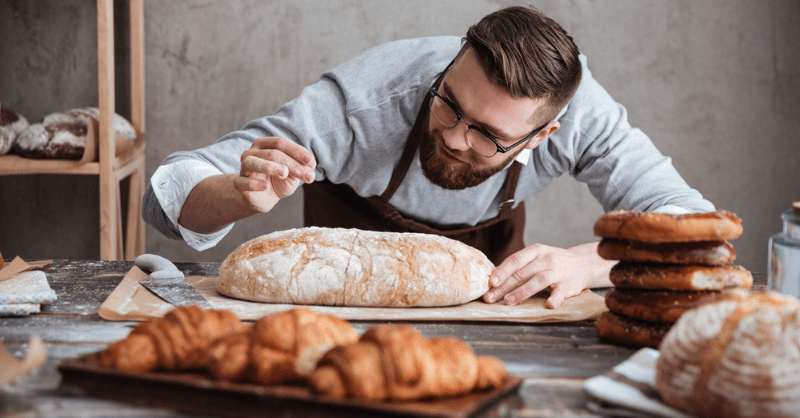
Bakers make breads, pastries, and other baked goods by mixing materials as directed.
Bakers produce breads, pastries, and other baked goods for supermarkets, wholesalers, restaurants, and institutional food services.
Bakers may be found in the following places:
- Commercial bakers, sometimes known as production bakers, work in factories where breads, pastries, and other baked items are produced. Bakers at these plants use high-volume mixing machines, ovens, and other automated equipment to mass-produce uniform baked goods. They strictly follow production schedules and formulae.
- Retail bakers often work in grocery shops and speciality retailers such as bakeries. In these contexts, they produce smaller quantities of baked goods for consumers to enjoy in-store or to sell as specialised baked goods. In addition, retail bakers may take client orders, make baked items to order, and sometimes serve customers. Although the number created and sold at these places is often small, they typically come in various flavours and sizes. The majority of retail bakers must also clean their work area and equipment, as well as unload supplies.
Some retail bakers own bakeries in which they make and sell breads, pastries, pies, and other baked goods. They are in charge of hiring, training, and managing their employees, as well as baking and supervising the whole baking process. In addition, they must plan and buy materials, set prices, and decide how much to produce each day.
Responsibilities
Throughout your apprenticeship, you may help:
- weigh out quantities of ingredients
- mix ingredients by hand or with catering machinery
- prepare dough
- bake products in batches in industrial ovens
- make quality checks
- decorate and finish baked items ready for dispatch or shop display
- take customer orders if working in a shop
- keep production areas clean
- stocktake and order supplies
- develop new recipes and products.
Salary
- Starting salaries for an apprentice is £16,000 per year.
- Experienced bakers can earn up to £24,000 per year.
Working hours
Throughout the day, grocery stores and restaurants provide freshly baked treats. Consequently, bakers are often assigned shifts in the early mornings, late nights, weekends, and holidays.
Bakers working in commercial bakeries that are always baking may be expected to work late hours and on weekends.
Working environment
You could work at a store or in a factory.
Your working environment may be dusty, physically demanding and noisy.
You may need to wear protective clothing.
Qualifications
Qualifications you can achieve as an apprentice baker include:
- Level 2 Baker – Entry requirements for this level include some GCSEs, usually including English and maths, or equivalent, for an intermediate apprenticeship. This qualification will take 18 months to complete.
Skills
On a bakery apprenticeship, you’ll learn:
- knowledge of food production methods
- the ability to work well with your hands
- to be thorough and pay attention to detail
- the ability to work well with others
- maths knowledge
- excellent verbal communication skills
- the ability to accept criticism and work well under pressure
- the ability to use your initiative
- to be able to carry out basic tasks on a computer or hand-held device.
Employers
Employers include:
- manufacturing facilities
- grocery stores and
- specialty shops
- bakeries.
Career path and progression
With time and experience, you might advance to the bakery supervisor, factory production manager, or commercial salesperson position.
You might also work as a technical consultant or development baker for a bakery or catering equipment company.
Another option is to specialise, such as in patisserie or as a craft baker, and launch your own business.
